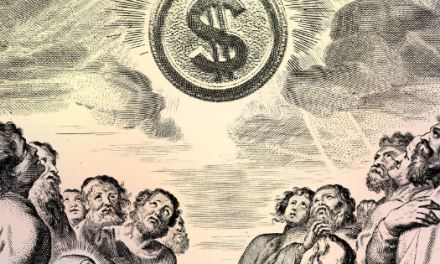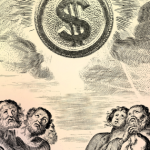This article was originally culled from the March edition of God, Man & Mammon: Navigating the tension between the material and the spiritual, Volume IV by Mitch Anthony.
For where your treasure is, there your heart will
be also…No one can serve two masters;
for either he will hate the one and love the other,
or else he will be loyal to the one and despise the other.
You cannot serve God and mammon
— Matthew 6:21, 24, NKJV
Jesus has sounded the alarm on the mesmerizing force of money. A common assumption is that our money follows our heart—If I really care about something, that’s where I’m going to put my money. But read Jesus’ words with care, there is a “counterintuitive” principle at work here: your heart follows the direction of your money, not vice versa. Once we allocate our resources, our attention and affections follow those resources so that we begin to care deeply about out investment. Jesus is warning us to be careful where we put our resources, because our love and devotion will not be far behind.
Jesus’ description of money’s magnetic pull on our attention and affections acknowledges its allure and power. When analyzing the frequency with which Jesus addressed money matters, one might suspect that he was preoccupied with the topic. In Matthew’s Gospel, money is mentioned 88 times. In Mark’s, it is mentioned 64 times. In Luke’s, there are 92 references. In John’s, the incident at the money tables in the temple is the first recorded sermon of Jesus. Almost 40 percent of the parables and 17 percent of passages in the New Testament address our relationship with money. All these references are not for naught.
The topic of money warranted Jesus’ attention because in this world money demands our attention. The only place in the New Testament where we read about Jesus going into a rage was when he walked into the temple with a homemade whip (that he constructed for the confrontation), poured out cash boxes, turned over tables of merchandise, and shouted, “…Take these things away! Do not make my Father’s house a house of merchandise!” (John 2:16, NKJV). This public paroxysm exposed a stirring jealousy for human affection. Jesus was incensed that a temple constructed for the purpose of worshipping the one true God had become a market for extorting the worshipper.
Temple officials, holding the authority to approve doves or goats used as sacrifices, would only approve those sold within their outer court––nothing brought in from the outside qualified. The up-charge was up to 20 times what a person could buy the same creature for elsewhere. Consequently, worshippers approached their sacrifice with financial dread. Temple officials had turned a holy practice into a gouging ritual. The love of money had succeeded in polluting the love of God beyond recognition. Jesus’ rage, if nothing else, was an expression of empathy for the sincere worshippers.
The love of money is a topic of grave importance for our well-being, which may be why Jesus focused on the topic of money as frequently as he did. As we read the passages and read between the lines, it becomes clear that Jesus understands our vulnerabilities and tendencies around money. The broad implication is that he clearly recognizes that money actually has something to offer—and that “something” moves in direct conflict with his agenda. In short, money promises earthly status, control, and self-reliance, which are all rooted in pride. The love of money then is a fulcrum for the pride of life that John warned us about, propping up the worst parts of our nature. Jesus understands how easily and fluidly money moves from a necessity to an idol in the average person’s life. So he cautions, ““Little children, keep yourselves from idols” (John 5:21).
The necessity for money is always with us. We can’t eat without it, unless we can multiply bread and fish upon command. We can’t clothe ourselves without it, unless we choose to wear animal skins. Transportation costs money, as does staying in one place. Jesus clothed, ate, drank, traveled, and stayed in many places as part of his ministry. Money was involved in each day’s agenda and travels. We are told of occasions where Jesus performed miracles that transcended the typical forms of trade with money: the fish and loaves, the tax payment found in a fish, and the mysterious mule that appeared for his hailed ride into Jerusalem. But aside from these incidents, Jesus was receiving and disbursing money through instructions to his team like any other enterprise. As he went about “his Father’s business,” he appointed a treasurer, Judas, whose infamous fiduciary drama we will visit in a later edition. Jesus’ teaching bridges the distance between the reality that while we cannot sustain our lives without money, we can live without the obsessive influence it tempts us with—and we can obtain such means without compromising our meaning.
WHAT IS MAMMON?
Money will never cease to ask for our love and service.Once we yield, we are in the realm of mammon––and we become slaves to the material.
Jesus exposes the potential for devotion surrounding the substance of money an the otherworldly grip forged within our souls through constant exposure to this “mammon.” Jesus’ warning that we cannot serve both God and mammon alerts us that there will always be a spiritual tension with money matters. Money will never cease to ask for our love and service. Once we yield, we are in the realm of mammon––and we become slaves to the material.
Mammon comes into play when our affections, egos, and rationalizations begin to elevate the importance of money in our thought processes and behavior. Once this sentiment gains a foothold in our affections, the benign satisfaction of simply having money begins to morph into a literal “love of money.”
Jesus’ teachings indicate that money has the ability to tempt us into thinking that pursuing it will pay off more than pursuing Him. The distraction is subtle upon introduction and is typically tied to noble ideas, such as supporting our family, advancing, and making progress. But Jesus, understanding how quickly the idea of “getting ahead” can get into our minds, warned of the rationalization pattern––the moneyed perspective that eventually takes over every consideration in our lives. We end up living a life where money is the chief consideration for every decision made; where we are perpetually obsessing over the “money angle.” It is the math of self-centered living.
We have all encountered mammon’s influence. It dwells in the person who would do anything to get ahead, in the man who would sell a broken- down heap to his own mother, in the avaricious woman who manipulates others for her gain, in the family member who extorts from an older frail relative, and in the power broker who breaks others for kicks. They all live by the logic of greed. The end result of this rationalization process is a form of idolatry where money is “worshipped” in the decision-making process.
Money is the material thing, whereas mammon is the possessive attitude and self-serving perspective that gets shaped around the material thing. Allow the mammon mindset to gain control in a singular instance, and in a matter of time that mindset will take up permanent residence. This mammon influence will instruct where to go, what to do, who to talk to, how to appear before others––simplifying all of life’s decisions by reducing them to a financial bottom line.
Jesus called out mammon as an archenemy when he said that we cannot “serve both God and mammon.” I find it interesting that he didn’t point his finger at the devil. There is no doubt that Satan is God’s archenemy, but he wasn’t mentioned in this context. There may be Satan worshippers out there, but there are millions more bowing to the money god. In this instance, he didn’t call out the religious establishment and their control tactics. He understood that the religious hypocrites exploited weakness most often in matters around money. The greatest betrayal in history––hatched by Israel’s religious leaders––was completed over 30 silver coins.
Jesus specifically named mammon as public enemy number one. It is the destructive spirit that can gain possession of the soul and abide wherever the exchange of money is executed. Whenever money is involved, we are in a position to be influenced by mammon. The more money we get, the more mammon speaks. And the more we listen to money rationalization, the more persistent the voice becomes––until mammon’s thoughts become the automatic script. If we are not vigilant to identify the language of mammon, we can easily fall into its grip. It’s not difficult to identify those in mammon’s control––they are loyal to personal profit and nothing else.
The force of money has evolved and transmuted over time. We can gain insight into how money has gained broader attention in our daily lives by tracking the history of money and trade. As the forms associated with trade have evolved, so has the temptation to act rashly, unfairly, and whimsically within financial decisions. It doesn’t take nearly the time to go broke or cheat others with credit cards and electronic transfers as it once did with goats and grain. Nevertheless, whether one is trading goats or in an online account, one’s intentions around money are a spiritual matter—a matter of the heart. It is the heart that Christ speaks to, and it is mammon that infects the heart in money matters.
Jesus requires loyalty
to his calling and his cause but often loses out
on that devotion as people
are systematically pulled
away from their higher designs by the force of money.
I no longer wonder why Jesus spoke such piercing and forceful
words on this topic. He assumes servitude somewhere
for all of us. We’re designed to serve
God…but if we choose not to, the most likely altar at which we’ll bow is at the
altar of money.









